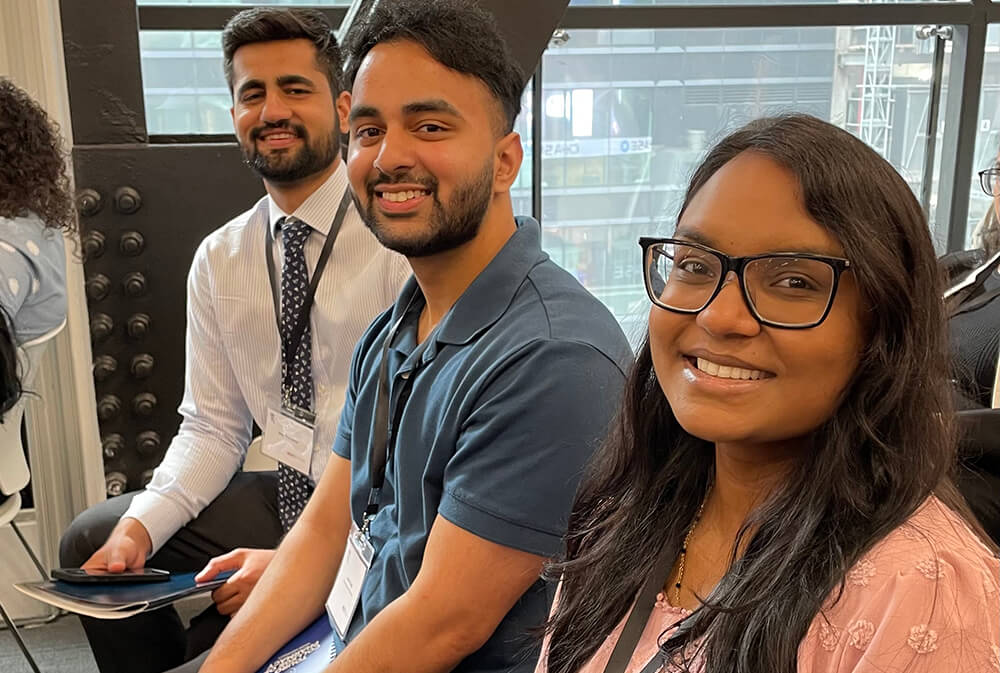News
AI Sparks Debate at Touro College of Pharmacy: ChatGPT's Role in Clinical Practice Scrutinized
More Than 200 Clinical Pharmacists and Students Gather to Discuss ChatGPT’s Rapid Growth and Cautionary Use in Healthcare and Education

ChatGPT generated a buzz at Touro College of Pharmacy (TCOP) recently, where over 200 clinical pharmacists, TCOP faculty and students gathered for the 19th Annual New York City Regional Pharmacy Conference of the New York Society of Health-System Pharmacists.
The main focus was a keynote presentation, “ChatGPT: Friend or Foe in Pharmacy Practice”, that centered on what OpenAI’s ChatGPT is, how the model works, and how it can be used confidently – and should be used cautiously - in practice and academic settings.
TCOP Dean Henry Cohen and Dr. Salomon Amar, senior vice president for research affairs at Touro University, opened the meeting, followed by a lively presentation and discussion led by faculty from Arnold & Marie Schwartz College of Pharmacy and Health Sciences at Long Island University.
Growth “Astronomical”
“The growth of ChatGPT has been astronomical,” said Dr. Tina Zerilli, associate professor of pharmacy practice at LIU, who began the presentation.
After its launch in November 2022, the number of users grew to one million in five days, and as of March 2024 the site had 1.8 billion visits, she said. In the U.S., where most users are, 23 percent of adults have used it and those using it the most are between 18-29 years of age.
Dr. Zerilli shared how to write “prompts” to generate responses, and how the model is “trained” to answer them with information publicly available on the internet, licensed from third parties, and content shared by users including prompts by users who query the platform.
Possible uses range from analyzing research from multiple sources; writing and editing documents; and in patient care - enhancing empathy when communicating with patients.
At the same time, platform’s limitations were noted.
“AI may at times generate responses that are unintentionally biased and discriminatory. So you really have to review those responses and make sure you aren’t unintentionally offending any particular group,” said Dr. Sara Grossman, LIU associate professor of pharmacy. “ChatGPT must be used responsibly and transparently, knowing its limitations. It’s a wonderful starting point for many different tasks.”
“Fabricated” and “Unsatisfactory” Results
Dr. Zerilli shared results of a study assessing the ability of ChatGPT to provide accurate and complete responses to drug information questions. In the study, 74 percent of the answers were found to be “unsatisfactory”, with references to support the answers often fabricated.
Dr. Elizabeth Unni, chair and associate professor of TCOP’s Department of Social, Behavioral and Administrative Sciences, said she was surprised by the study’s results.
“As a researcher, I was taken aback learning that such a high percentage of the drug information questions were answered in a suboptimal way. The results showed that how questions are asked in the prompts can be a game changer,” she said. “Experienced pharmacists are likely to know how to ask questions and understand the importance of verifying the accuracy of the chat’s responses; however, not all students or healthcare providers may be aware of this.”
Dr. Batoul Senhaji-Tomza, associate dean, curriculum and founding director of TCOP’s PharmD/MPH Collaborative Program, expressed concern about patient safety and called for a public health initiative or policy to educate the public on the proper and safe use of AI.
“This is imperative, particularly when it comes to medical questions,” she said. “Perhaps a clear warning on the ChatGPT page indicating not all responses are accurate and cannot be substituted for proper healthcare professional advice or consultation is necessary to raise awareness among the public.”
Student Perspective
Dr. Senhaji-Tomza called for academic institutions to develop policies and guidelines that both embrace AI tools for learning while emphasizing responsible use. “Having open conversations about advantages and limitations is necessary to prepare students to continue thriving in the AI world of tomorrow,” she said.
TCOP students in attendance expressed similar skepticism.
“We have to embrace that this software is going to be highly utilized. Like anything, we can abuse it but we have to prevent that by maintaining our professionalism and also setting boundaries,” said rising P4 Robert Valmont. “If you’re a clinical pharmacist asking about disease management or recommended dosing, it may not generate the correct information. It cannot replace our clinical experience and judgment.”
Valmont said AI should not be used for patient counseling and students should not use it. “I think it’s more genuine when we come up with our concept of how to communicate with a patient and how to make them feel welcome,” he said. “Making presentations and researching and navigating through the web on our own is a helpful way to learn, rather than getting it fed to us by ChatGPT.”
Harshini Sobhan, also a rising P4, said she had experimented with the platform to help understand an article she was reading. “It actually worked. It made some things easier to understand,” said Harshini, adding she would not want to use it to research medications or dosage for a customer or patient. “I would pull from established and reputable tertiary drug information resources, guidelines and studies that have been conducted. I didn’t realize how much AI has become part of our everyday lives,” she said.

